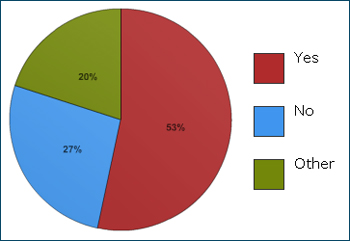 We have been registering a surge in applications from affiliates who either list no other website but a URL of their social media profile (on Twitter, Facebook, etc), or list their social media profile(s) (some – more than one) as the main website(s) where they plan to promote the merchants whose affiliate programs will accept them.
We have been registering a surge in applications from affiliates who either list no other website but a URL of their social media profile (on Twitter, Facebook, etc), or list their social media profile(s) (some – more than one) as the main website(s) where they plan to promote the merchants whose affiliate programs will accept them.
I have polled a group of affiliate program managers to see how they normally respond to such applications. The question was: “Do you accept affiliates who list their social media profile as main website?“
Here is how the pie chart looks at the time of this post:

Those who have chosen to vote for the “other” option, posted the following clarifications:
- Not usually, though if they look like they have a good following or decent website attached I will.
- Occasionally. Social Media is okay in my book, provided that their profiles don’t come across spammy.
- Depends on the merchant and the affiliate application. If it’s obvious from their social media page that they know what they are doing, meet the merchant criteria and are playing by the rules, I’ll usually accept them and keep an eye on them for awhile
Basically, in favorable circumstances all of the above presuppose a positive reply, which shows that a majority of the polled affiliate program managers are supportive of affiliate use of Social Media.
Is this becoming a new trend?
If you manage an affiliate program, and haven’t participated in the above-quoted poll, I’d like to encourage you to please cast your vote here as well.
I think it’s OK Geno. I for example have started to create social media accounts for my affiliate websites.
Ciprian, thank you for the affiliate take on the question.
The above-described situation is a bit different though. These are not social media accounts for their main websites, but the only online presence they have. Hence, the question of whether such affiliates can really benefit a merchant.
I think web 2.0 is great as far as making connections and list building but as far as just making sales with just promoting affiliate links I don’t think they will do to well.
Maybe a sale here and there but nothing to really get worked up about.
If you had a very large number of affiliates making a few sales with just web 2.0 it is worth it.
But I would rather have 5 super affiliates than 100 noob spammers any day
I was a bit iffy about this at first, but after seeing some very vocal affiliates with thousands of followers who were actively participating in the affiliate’s conversation ( esp w/ facebook ) it shifted my opinion a lot.
Because there are so MANY twitter spammers, it’s very difficult for me to accept someone who uses their twitter account for their sole advertising channel.
But I found it is a lot easier to simply stop the people who are abusing twitter for the affiliate program, than to reject everyone who uses a twitter URL for their main site.
@ Nick: So you’d vote “no”, because you view Social Media as more of a networking tool than a viable channel to use in affiliate marketing?
@ Ron: Good points. One question. How do you police affiliates that use Twitter (to catch abuse quickly enough for them not to do too much damage to your brand)?
I personally have been accepted to multiple Affiliate Programs by including Social Media properties in Website fields. IMHO, this is a rational decision on the part of the Network/Merchant, provided the properties appear to be well-kept (i.e. not spam, and obvisouly with good intentions and strong marketing capabilities included). =)
Thanks for the post,
Kyle
Kyle, thanks for chiming in. Yes, many affiliate networks are obviously approving affiliates who list their social media website/url as their main website. I was wondering how fellow affiliate program managers and OPMs approach such applications.
BTW, do you think Social Media affiliates should disclose (to their friends/followers) that the links they’re tweeting and posting are affiliate links?
Great post Geno! I think it also depends on the merchant policies and the vertical that you’re in. Personally, I’ve seen some good amount of sales coming from social media affiliates from Facebook for the retail vertical. A good article that I came across:
http://www.adotas.com/2009/06/debunking-the-myths-of-social-media-advertising/
Regarding, Twitter there are some affiliate sites who tweet your deals to their members. The success through this, I believe would greatly depend on how well the demographic connects with the merchant’s product or service. But again, it would be hard to police the Twitter affiliates.
Kunal, thank you for your thoughts.
That paragraph on Myth #2 in the above-quoted Adotas’ article nails it — by engaging the Social Media audience through affiliates that are active in the space, advertisers/merchants can both measure their “ROI with social advertising”, and fully benefit from the pay-for-performance-only nature of affiliate marketing (read: not invest any additional funds into advertising via Social, but outsourcing it to affiliates).
The question of monitoring placements of Social Media ads by affiliates is still open though. On Twitter you can police using the search function (or setting your TweetDeck to monitor all trademarks/keywords related to your brand). How do affiliate program managers monitor ad placement on Facebook and MySpace, and other media?
I agree with you on the feedback for Myth #2. Also appreciate the thoughts on policing Twitter affiliates.
In the case of Facebook ad placement; the affiliate was well known and had asked for permission if promoting through social media was allowed. It would be a good idea for merchants to update their program policies to show if social media is permitted or not.
In some instances, I was also checking the referral URL’s and confirming stats with the merchant and/or network. But it might be worthwhile to look into social media for affiliate managers and perhaps limit few known affiliates in the beginning and see how that works.
I voted yes. Without a doubt, it works.
The same rules as email affiliates apply, just make sure to be ethical, don’t lie, and don’t be spammy.
Thanks, Matt.
I like the idea of transferring the rules/policies for email affiliates onto social media ones.
@ Geno
I definitely police twitter via tweetdeck and trade name searches. I’ll then take a closer look at the affiliates material, presentation and tweet frequency to determine if this is something that I feel comfortable allowing to continue.
Yes, it is definitely something that needs to be closely policed on a regular basis.
Geno,
Great piece of information in this thread. Social Media is for being social and unfortunately too many people spam their affiliate links. I think the non spammy way to approach it is to move your social followers, who you have developed a relationship with to your email list and sell them your affiliate products that way.
Dr Deb Nd
Boston
How would you define spamming one’s affiliate links, Deb?
Since in most cases with Social Media, it is only those that follow you (or are your “friends”) that can see your links/posts/tweets, I wonder how some of the spammy affiliates still have followers. Just a rhetorical question, I guess.
Interestingly enough, Forrester does not expect Social Media to become one of the key channels for affiliate marketing in the next 5 years [more here]
This is a good stuff! Regarding, Twitter there are some affiliate sites who tweet your deals to their members. The success through this, I believe would greatly depend on how well the demographic connects with the merchant’s product or service. But again, it would be hard to police the Twitter affiliates.
Zunaira, thank you for your comment.
Yes, demographic connection with the merchant’s product/service + quality of those Social Media connections that the affiliate has. Some just follow everyone who would follow them. Are 2000 of such followers equal in quality to 2000 of those that have chosen to follow you on Twitter because you post deals there? Definitely not.
Robert Half Technology has just published some important data: 54% of U.S. workplaces prohibit Facebook and Twitter access completely, while 19% permit it “for business purposes only”. That makes up a total of 73% workplaces that block social media use for personal purposes.
Something for Social Media affiliates to keep in mind, and practice dayparting.